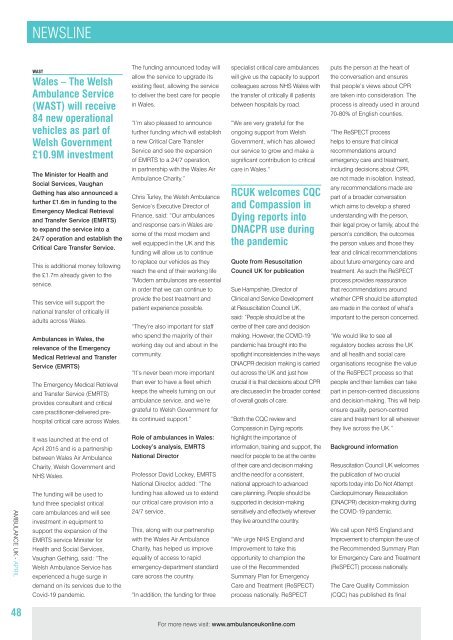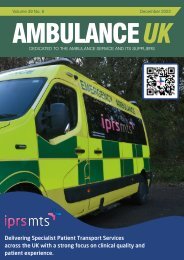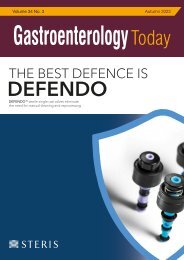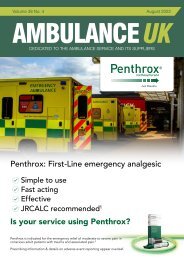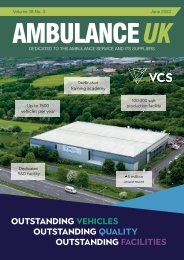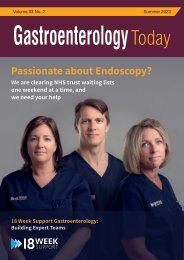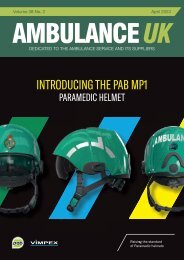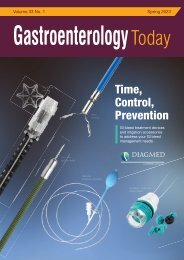Ambulance UK April 2021
Ambulance UK April 2021
Ambulance UK April 2021
You also want an ePaper? Increase the reach of your titles
YUMPU automatically turns print PDFs into web optimized ePapers that Google loves.
NEWSLINE<br />
WAST<br />
Wales – The Welsh<br />
<strong>Ambulance</strong> Service<br />
(WAST) will receive<br />
84 new operational<br />
vehicles as part of<br />
Welsh Government<br />
£10.9M investment<br />
The Minister for Health and<br />
Social Services, Vaughan<br />
Gething has also announced a<br />
further £1.6m in funding to the<br />
Emergency Medical Retrieval<br />
and Transfer Service (EMRTS)<br />
to expand the service into a<br />
24/7 operation and establish the<br />
Critical Care Transfer Service.<br />
This is additional money following<br />
the £1.7m already given to the<br />
service.<br />
This service will support the<br />
national transfer of critically ill<br />
adults across Wales.<br />
<strong>Ambulance</strong>s in Wales, the<br />
relevance of the Emergency<br />
Medical Retrieval and Transfer<br />
Service (EMRTS)<br />
The Emergency Medical Retrieval<br />
and Transfer Service (EMRTS)<br />
provides consultant and critical<br />
care practitioner-delivered prehospital<br />
critical care across Wales.<br />
The funding announced today will<br />
allow the service to upgrade its<br />
existing fleet, allowing the service<br />
to deliver the best care for people<br />
in Wales.<br />
“I’m also pleased to announce<br />
further funding which will establish<br />
a new Critical Care Transfer<br />
Service and see the expansion<br />
of EMRTS to a 24/7 operation,<br />
in partnership with the Wales Air<br />
<strong>Ambulance</strong> Charity.”<br />
Chris Turley, the Welsh <strong>Ambulance</strong><br />
Service’s Executive Director of<br />
Finance, said: “Our ambulances<br />
and response cars in Wales are<br />
some of the most modern and<br />
well equipped in the <strong>UK</strong> and this<br />
funding will allow us to continue<br />
to replace our vehicles as they<br />
reach the end of their working life<br />
“Modern ambulances are essential<br />
in order that we can continue to<br />
provide the best treatment and<br />
patient experience possible.<br />
“They’re also important for staff<br />
who spend the majority of their<br />
working day out and about in the<br />
community.<br />
“It’s never been more important<br />
than ever to have a fleet which<br />
keeps the wheels turning on our<br />
ambulance service, and we’re<br />
grateful to Welsh Government for<br />
its continued support.”<br />
specialist critical care ambulances<br />
will give us the capacity to support<br />
colleagues across NHS Wales with<br />
the transfer of critically ill patients<br />
between hospitals by road.<br />
“We are very grateful for the<br />
ongoing support from Welsh<br />
Government, which has allowed<br />
our service to grow and make a<br />
significant contribution to critical<br />
care in Wales.”<br />
RC<strong>UK</strong> welcomes CQC<br />
and Compassion in<br />
Dying reports into<br />
DNACPR use during<br />
the pandemic<br />
Quote from Resuscitation<br />
Council <strong>UK</strong> for publication<br />
Sue Hampshire, Director of<br />
Clinical and Service Development<br />
at Resuscitation Council <strong>UK</strong>,<br />
said: “People should be at the<br />
centre of their care and decision<br />
making. However, the COVID-19<br />
pandemic has brought into the<br />
spotlight inconsistencies in the ways<br />
DNACPR decision making is carried<br />
out across the <strong>UK</strong> and just how<br />
crucial it is that decisions about CPR<br />
are discussed in the broader context<br />
of overall goals of care.<br />
“Both the CQC review and<br />
Compassion in Dying reports<br />
puts the person at the heart of<br />
the conversation and ensures<br />
that people’s views about CPR<br />
are taken into consideration. The<br />
process is already used in around<br />
70-80% of English counties.<br />
“The ReSPECT process<br />
helps to ensure that clinical<br />
recommendations around<br />
emergency care and treatment,<br />
including decisions about CPR,<br />
are not made in isolation. Instead,<br />
any recommendations made are<br />
part of a broader conversation<br />
which aims to develop a shared<br />
understanding with the person,<br />
their legal proxy or family, about the<br />
person’s condition, the outcomes<br />
the person values and those they<br />
fear and clinical recommendations<br />
about future emergency care and<br />
treatment. As such the ReSPECT<br />
process provides reassurance<br />
that recommendations around<br />
whether CPR should be attempted<br />
are made in the context of what’s<br />
important to the person concerned.<br />
“We would like to see all<br />
regulatory bodies across the <strong>UK</strong><br />
and all health and social care<br />
organisations recognise the value<br />
of the ReSPECT process so that<br />
people and their families can take<br />
part in person-centred discussions<br />
and decision-making. This will help<br />
ensure quality, person-centred<br />
care and treatment for all wherever<br />
they live across the <strong>UK</strong>.”<br />
AMBULANCE <strong>UK</strong> - APRIL<br />
It was launched at the end of<br />
<strong>April</strong> 2015 and is a partnership<br />
between Wales Air <strong>Ambulance</strong><br />
Charity, Welsh Government and<br />
NHS Wales.<br />
The funding will be used to<br />
fund three specialist critical<br />
care ambulances and will see<br />
investment in equipment to<br />
support the expansion of the<br />
EMRTS service Minister for<br />
Health and Social Services,<br />
Vaughan Gething, said: “The<br />
Welsh <strong>Ambulance</strong> Service has<br />
experienced a huge surge in<br />
demand on its services due to the<br />
Covid-19 pandemic.<br />
Role of ambulances in Wales:<br />
Lockey’s analysis, EMRTS<br />
National Director<br />
Professor David Lockey, EMRTS<br />
National Director, added: “The<br />
funding has allowed us to extend<br />
our critical care provision into a<br />
24/7 service.<br />
This, along with our partnership<br />
with the Wales Air <strong>Ambulance</strong><br />
Charity, has helped us improve<br />
equality of access to rapid<br />
emergency-department standard<br />
care across the country.<br />
“In addition, the funding for three<br />
highlight the importance of<br />
information, training and support, the<br />
need for people to be at the centre<br />
of their care and decision making<br />
and the need for a consistent,<br />
national approach to advanced<br />
care planning. People should be<br />
supported in decision-making<br />
sensitively and effectively wherever<br />
they live around the country.<br />
“We urge NHS England and<br />
Improvement to take this<br />
opportunity to champion the<br />
use of the Recommended<br />
Summary Plan for Emergency<br />
Care and Treatment (ReSPECT)<br />
process nationally. ReSPECT<br />
Background information<br />
Resuscitation Council <strong>UK</strong> welcomes<br />
the publication of two crucial<br />
reports today into Do Not Attempt<br />
Cardiopulmonary Resuscitation<br />
(DNACPR) decision-making during<br />
the COVID-19 pandemic.<br />
We call upon NHS England and<br />
Improvement to champion the use of<br />
the Recommended Summary Plan<br />
for Emergency Care and Treatment<br />
(ReSPECT) process nationally.<br />
The Care Quality Commission<br />
(CQC) has published its final<br />
48<br />
For more news visit: www.ambulanceukonline.com


